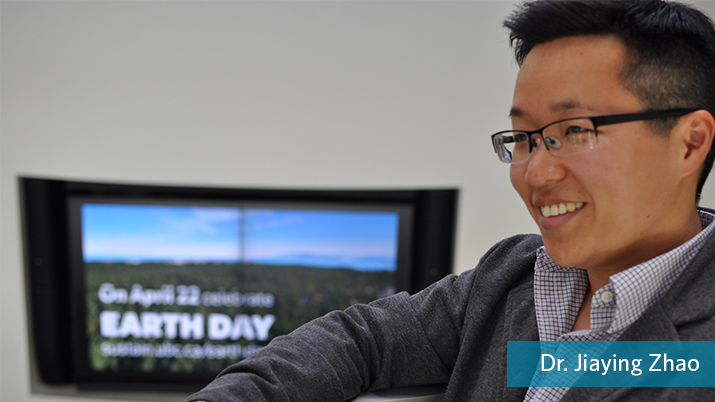

Jiaying Zhao at the Centre for Interactive Research on Sustainability (CIRS).
Reducing our carbon footprint not only involves wider systemic and policy change, it also demands that we make changes in our own behaviours and purchasing decisions. But what if you can’t afford to be green?
Dr. Jiaying Zhao, Canada Research Chair in Behavioural Sustainability at UBC, and Dr. Sonya Sachdeva, a research social scientist with US Forest Service, recently published a paper ‘Distinct impacts of financial scarcity and natural resource scarcity on sustainable choices and motivations’ in the Journal of Consumer Behaviour.
The research by Zhao and Sachdeva finds that people under financial scarcity were less motivated to make sustainable choices in their purchases. However, if people knew the cost-saving benefits of green products, they were likelier to purchase those products.
Zhao, who examines how resource scarcity impacts human cognition and behaviour, joins us for an Earth Day Q&A to share the research findings and the factors around making green consumer choices.
Can you tell us about this new research?
In this paper, we examined how different forms of scarcity influence consumer choices for sustainable products in an online shopping task. We specifically looked at financial scarcity which involves not having enough money to buy the things you want, and water scarcity which involves a drought in your area.
How does financial stress influence our sustainable choices?
We found that financial scarcity reduced sustainable product choices and lowered pro-environmental motivations. In contrast, water scarcity increased sustainable choices and motivations, but to a much smaller extent. The results highlight the differential power of financial scarcity and water scarcity on green consumerism. Importantly, the inability to afford sustainable products outweighs the desire to be environmentally friendly.
What other factors drive poor decisions around sustainability?
Price and framing matter too. We found that the effect of scarcity on sustainable choices is constrained by the price of sustainable products. That is, when sustainable products are less expensive than conventional ones, people under financial scarcity choose more sustainable products. This suggests that alleviating the condition of financial scarcity either by having a larger budget or lowering the price can increase green consumer choices. Moreover, describing the financial cost-saving benefits of the green products boosted the selection of these products by participants in the scarcity condition.
Do you have advice on how we can make better sustainable choices?
Yes, we need to alleviate poverty, which seems irrelevant to environmental sustainability on the surface, but we show a deeper connection where lifting people out of financial scarcity can increase sustainable choices.
Jiaying Zhao is the Canada Research Chair (t2) in Behavioural Sustainability, and an Associate Professor in the Department of Psychology and the Institute for Resources, Environment and Sustainability at UBC. She is the principal investigator of the Behavioral Sustainability Lab at UBC. Her research aims to use psychological principles to design behavioural solutions to address sustainability challenges.


